Hurricane Helene: A Seed Saver's Sorrow and Jim's Ballad
A piece by Veronica Limeberry (IG: @veronicabythesun)
This piece was written by Veronica Limeberry for Mergoat Magazine. In it, she reflects on her first encounter with elder seed-saver Jim Veteto after Hurricane Helene struck his home in South Central Appalachian region. Please read to the end, where you will also find a recording of Veteto singing an agonizing ballad he wrote the night after the storm.
The Blue Ridge Mountains are the most beautiful place on earth. I’ve said this numerous times over the last three decades. I was born in Candler, near West Asheville. I’m old enough to have went to Venable before it was Sand Hill (if you know, you know). I graduated from Enka, marking my place and ancestry in Western North Carolina. I first left WNC to work in Jonesborough and Johnson City. This region is my home, and home to the stories of my family, my friends, our lands, our waters. I’ve spent endless nights breathing in the mountain air, under hot summer stars, and oak-swept wind.
This October I was supposed to take my 16 month old baby on her first drive to look at the leaves of the Blue Ridge Parkway. A drive I’ve been on every fall since I can remember. Now, I-26 between Erwin, TN and Asheville, NC doesn’t exist. I-40 on the border has been washed away too.
How do I begin this story? The one that starts with the rage of water, flooding beyond every historic line in recorded history. The one that marks the ‘before’ and the ‘after’ so painfully clear; a path of shattered houses, ancient trees, old bridges, entire lives battered and destroyed, left on receding banks of toxic mud? Honestly, I can’t. I can’t tell you what it feels like to drive home on an emergency mission to heal whatever impossibly small rifts I can; to look at these highways and roads and bridges as arteries that fed our hollers, that brought our communities together…these arteries and bridges that have been ripped up and washed away, taking with them stories and ancestry and cultural connections. So I’ll tell you what I did and who I met and what they did. That’s all I’ve got right now.
My mission to Celo community in Burnsville was because of Jim Veteto; a seed-saving elder, who for almost forty years has worked across Appalachia with mountain folk and the Eastern Band of Cherokee Indians, collecting our ancestral seeds and the stories that go along with them. He is the founder of the Southern Seed Legacy and the Appalachian Institute for Mountain Studies (AIMS). He holds some of the last remaining varieties bred by many Native, Black, and rural holler folk in this region; he has their voices on old CDs; in at least one case, he was the last person to speak with someone before they passed from this world.
This last summer, through Utopian Seed Project and the Ujamaa Oral History Project, I was working with Jim on restoring and digitizing his collection; properly archiving it and helping to spread it among new and young seed growers in our region. We had just gotten money to get him a new refrigeration system, though we hadn’t got it up the mountain yet. His institute, an old farm house that is mostly off grid, on the side of a sacred mountain with an orchard, tea garden, altitude-adapted corn, herbal medicine, and so much more, was home to porch-sitting and community sharing. He’d host weekly ballad singing and tea rituals; educational walks and stories; people from all over came to share in Jim’s home and knowledge, and to connect to these mountains.
The first night of the water, my (grand)momma was in the hospital at Mission in Asheville. I was in Charlottesville tending to my child and farm, checking in regularly as I watched the storm roll in through the little screen of my cell phone. Then the phones stopped working. I called her, my sister, my uncle, my cousin, my other cousin, my great aunt, every single number I could think of. The phones weren’t working. I watched through the screen as my friends in Erwin frantically posted about the Nolichucky taking the dam. In the end, the dam held; but at her peak she carried three times the daily flow of Niagara Falls.
The dam held, but much of the community did not. I watched in horror as the sun came up the next day, when I learned that I-26 was gone. I called friend after friend. Are you alive? Have you seen this person? Can I get to you? Are you alive? Are you alive? Are you alive?
Asheville still had no phones. Those of us on the outside were on Facebook, Instagram, Reddit, any forum we could, begging: have you heard from Holcombe holler? Sand hill? Is granny okay in Old Fort? Has anyone seen this person? I heard from someone who got out that Candler was okay enough, no power, no water, and Smoky Park was flooded. No cell service. No way in. No way out. To hell, I cried.
A local cousin and I devised a plan—we could get in. We could get to them. They could get out. The phones came back. Slowly. Many in Asheville woke to a world they didn’t realize had fallen into complete collapse. As they came back into service it became devastatingly clear that no one was okay and may never be again. My friends’ homes were washed away. Old Fort gone. Swannanoa gone. Marshall ravaged. Chimney Rock gone. Celo campground gone. Half of Erwin, gone. So many missing.
I reached out to Jim—are you alive? Are you alive? Are you alive? It took 48 hours for his response, I’m okay, barn washed away, I’m alive. He had torn his rotator cuff just a few days before this, and, not having healthcare, he didn’t have a way to be seen. With his one arm, he dug out the remaining seed refrigerator in a falling-down barn. I’m on my way, I tell him. He can’t call me and I can’t tell him when, but I tell him I’m on my way. In the beautiful, resilient ways that our people connect, I get a call from a friend who coordinates a seed school I assist with. We have seed growers that also own a solar company, they tell me. They have small kits, can you take them? The kits happen to be going to Celo, Burnsville—the divine providence of mutual aid.
I meet the folks with the solar kits and load my farm SUV completely full. The drive from Kingsport to Burnsville used to take a little less than an hour. How I never realized what a privilege that was. I-26 is ripped in half, and with it, our easy way through the mountains.
I take a long, winding route, through hollers I haven’t been through since high school. It takes almost three hours, but I arrive. Army trucks fill the roads, helicopters roar overhead. The air is heavy and silent. I drive by Marshall on my way through; I can tell I’m close when the rotting, toxic scent of wastewater and dead river overtakes my car. It comes through the closed windows and air vents. There is no shutting it out. I stop at the Ingles in Mars Hill to catch my breath, to breathe. The parking lot is full; makeshift donation tents dot the concrete. I go inside; the store is mostly empty of food. There are dozens of people walking around, many in dirty clothes, eyes empty and somewhere else from the shock; just walking. I walk in circles with them. There is a Wi-Fi station here, and several people sit teary-eyed at what used to be the tables for Starbucks in the store. There are so many people and cars in this enormous grocery store. It is almost dead silent.
I arrive in Burnsville about an hour later; there are supply stations, donation centers, army trucks, police lights, all along the route. Helicopters land in fields as I drive by. I keep going; Celo and South Toe are past the main town. I’m stopped at a washed out bridge turning into a holler: “mMa’am do you live here?” “No,” I answer, “I have solar kits and I’m checking on a friend.” He briefly looks into my car, smiles sadly and waves me on. “Be safe.” My stomach is in knots. Be safe.
In this torn apart landscape, where people’s homes rest in pieces on the roadside. Every ripped up house and smashed car I pass, I wonder: is someone still inside? Waiting to be found? Hidden in the mud? Power lines lay on the road or tied up in trees. Mud covers everything. Everything. I get to Celo community and meet with my connection here; a community organizer. She has lost her house. She takes half the solar kits for a community meeting later that day. What more is there to say? I’m sorry. I’m so sorry.
My farm SUV has four wheel drive and all terrain mode. Jim’s entire driveway is washed away and marked with deep ruts. I make it up, but can see how very few could. Jim is on the front porch of the hundred year old farm house. He waves, tells me he’s impressed but worried that I got up the driveway. “I’m okay, it’s fine,” I say.
I carry a case of beer to him. I had asked him earlier, “what can I get you? What do you need?” His answer: “Honestly, just a big beer would be nice.”
I pull on my knee high muck boots and go his porch. Seeds are laying in bags all around, flowing from a big plastic tub. We walk to his barn. The entire back is collapsing, missing. He’s been scraping mud with his one good arm, piling whatever he can up in the center. I worry about standing in the barn. It looks like it could fall at any second. The old seed refrigerator is tilted up on a wall, covered in mud. Jim dug it out himself as soon as he could to get the seeds---his life’s work; the life work of those who came before him; so many lives in those tiny seeds. I tell him he’s not alone; that myself and so many others got his emails, and we’re here. We raised money for him, it’s not much, but maybe it will help. The barn cannot be saved. The mountain washed its way all the way through it, not 25 yards from the front of his house.
We sit on the porch and talk while we sort seeds. He laid them out to dry and put them in new bags. We have to see what’s good; what can grow this year. Each bag holds the story of who they’re from. A Cherokee elder. An Affrilachian corn grower, who told Jim, “the ag man said I couldn’t breed corn like this, but God said otherwise” and here it is, this beautiful corn. Speckled purple October beans. An Amish fellow who grew Cherokee butterbeans but mislabeled them Lima beans. Story after story after story. So many lives in these seeds.
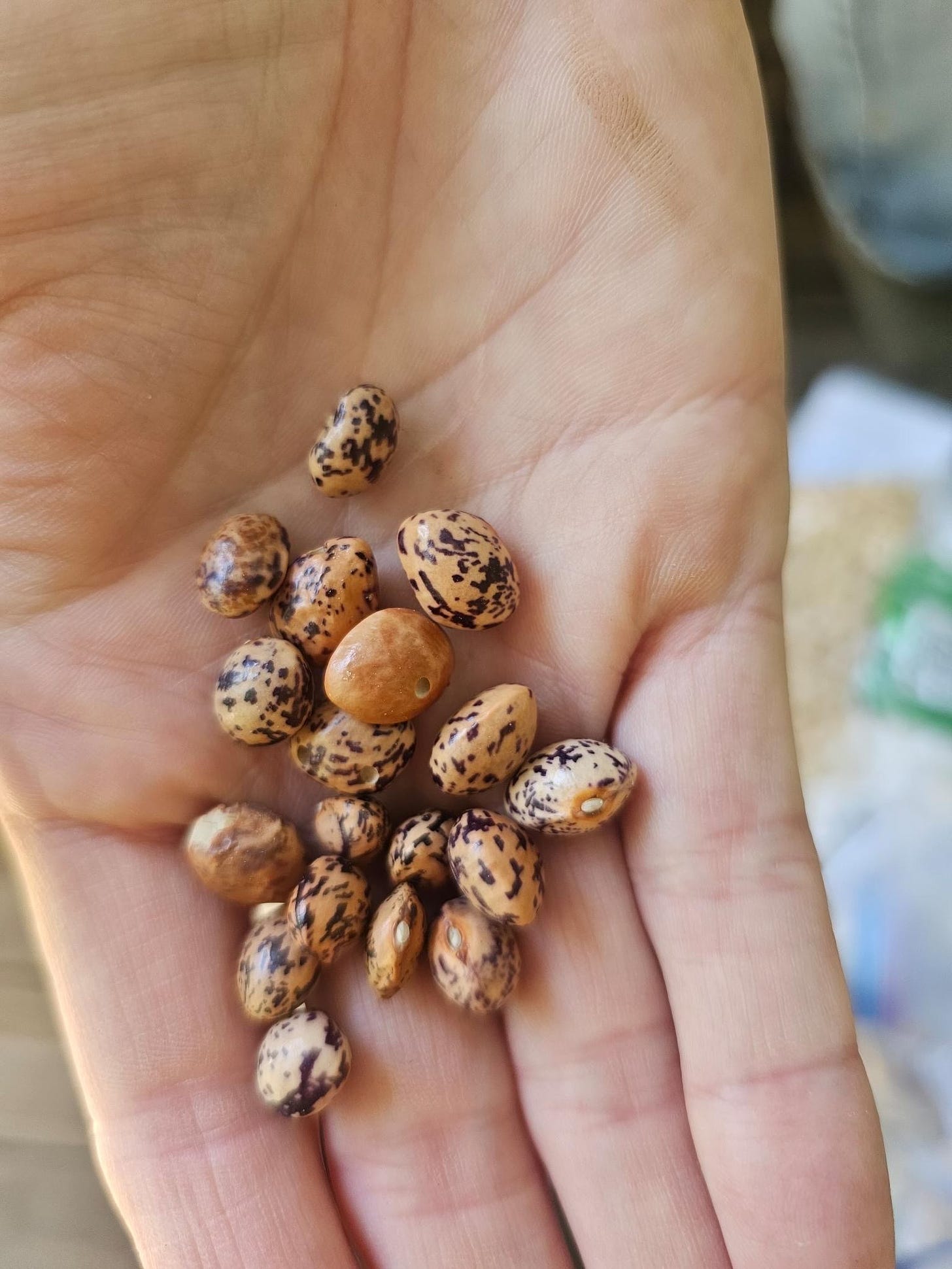
After a beer, Jim tells me about what it was like. He was worried the creek behind his house would wash him out, but it was the flood down the usually dry mountain that took everything instead. He told me of a mom with her four small children across the way who walked away from their house as it washed away; stumbling, but never falling; surviving. On the other side, he spoke of an elderly neighbor who ran out to scream at the storm, but did not make it back inside. Jim says all he could do was make peace with the spirits of this land; make peace with the fact that maybe his time had come. And he sat on the porch and sang.
Our conversation weaves between climate change science and Appalachian spiritualism. Facing the realities that are here; wondering if it’s gone too far to revert. We talk about the uktena swimming in the chaos of the raging water. About purification and grief. About how life must be radically different if any of us are going to survive. He finishes his beer and asks me, “do you want to hear a ballad I wrote?” He tells me, “All morning I didn’t know if I’d make it; but then at about noon the birds started singing, and I knew I’d be okay, that it was over. Then I wrote this song. The ballad is in the style of one county over.” I ask if I can record it, and he allows it.
The ballad shown above, performed by Veteto, is one he wrote the night after the storm hit. He sings it here in a style that is particular to area where he lives. The crooning of Appalachian balladeers often reflects a deep sorrow, lending the style to the difficult task of communicating grievous encounters like the one Veteto had with Helene. Video taken by Veronica Limeberry.
He sings. I weep. We sit in silence for a while, until Jim makes tea. Tea from his mountain, prepared in ritual, the only way Jim ever does. He tells me his tea ritual has kept him going these past days as he waited alone and washed away from the rest of the world on this mountain.
We sit the rest of the afternoon sorting seeds. The power returned this morning and we can put the ones to try to save into the freezer now. It’s going to be a long drive home, I know. I don’t want to leave. I want to hold everyone here in my arms and I want to scream and cry and rage and hope with them. There’s a curfew, though. I have to be off the roads before 7:30. Nothing is safe. Nothing is safe. So I have to leave.
I hug Jim and promise to be back; I promise to help build a new seed storage shed. To get the refrigeration for the seeds up here. To put together a work crew. It feels so small, but it’s all I know I can do. Tomorrow, I will go up to Haywood County, to Clyde, where people now live in tents on the land where their trailers once sat. But for this night, I drive home, to Candler, where there is no water, but where my uncle makes a beef stew on the grill. Everywhere I go, a blur of army trucks, debris, and broken roads. I can’t think, I can’t stop; when I pause tears come. When I pause the overwhelming silence takes over. I don’t know what to do. That’s all I can think. The next morning as I leave my house, my uncle says goodbye, ‘we’ll just keep on keeping on I reckon’. And that’s it. That’s all there is. My heart is broken.
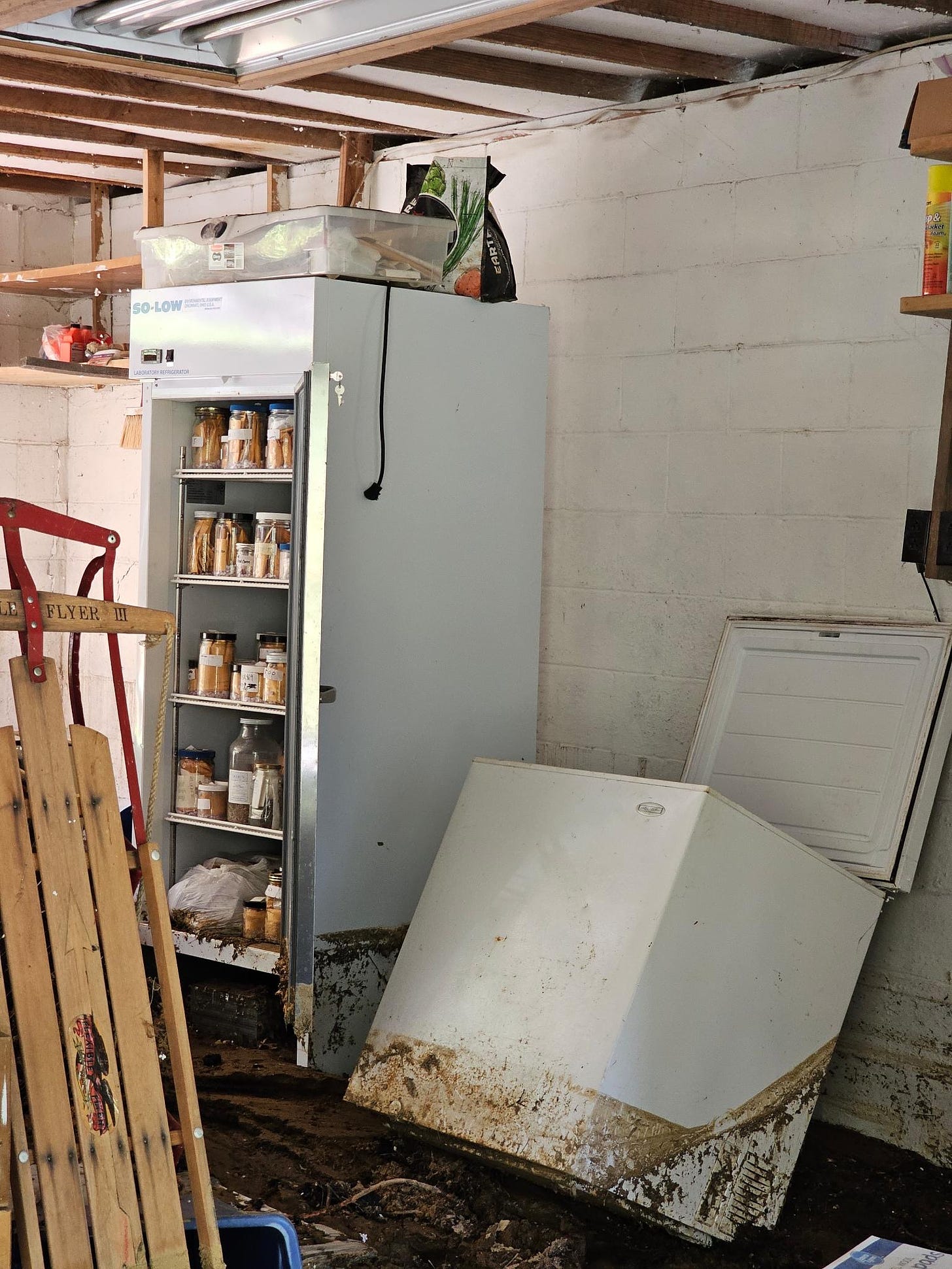
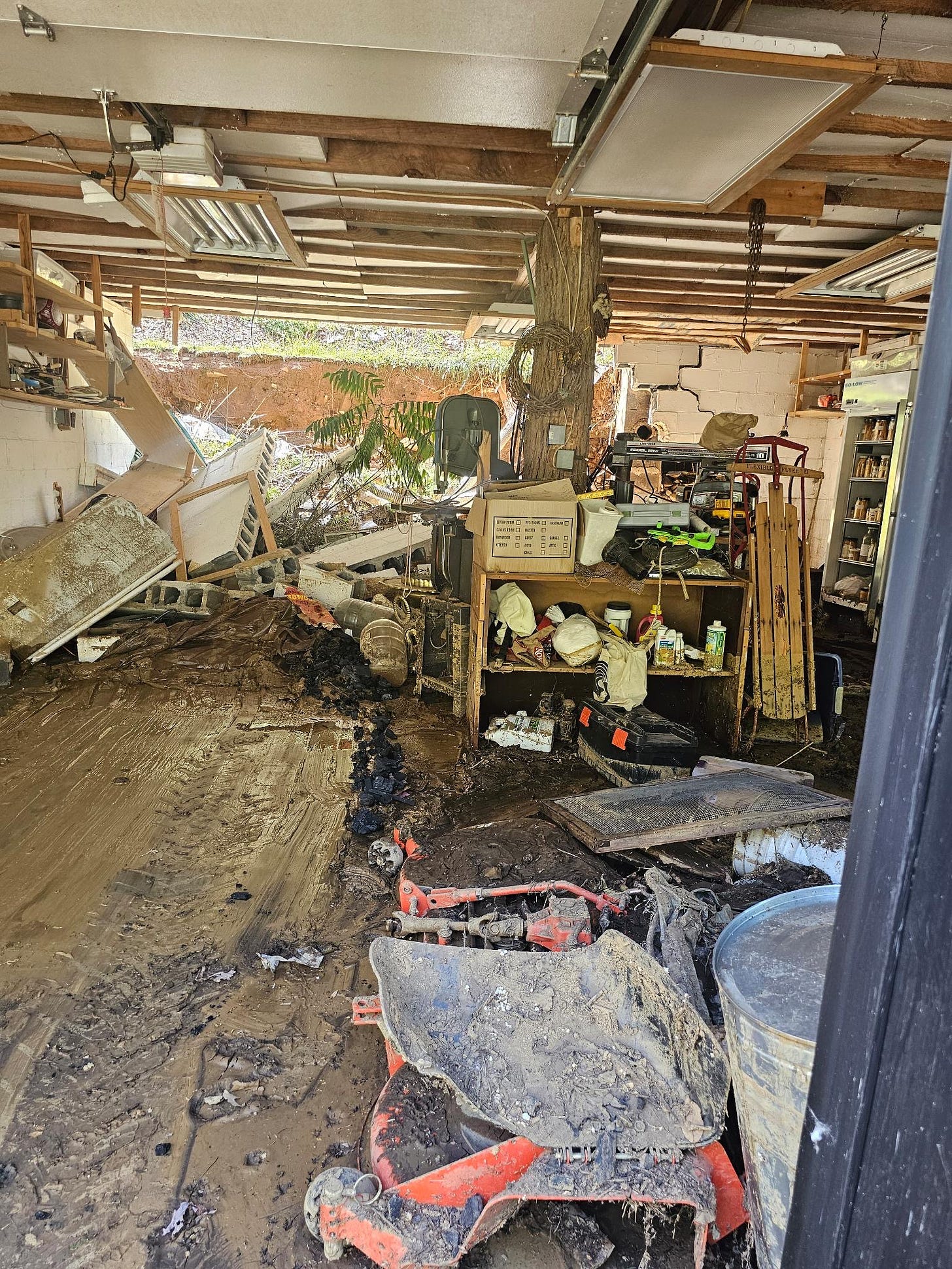





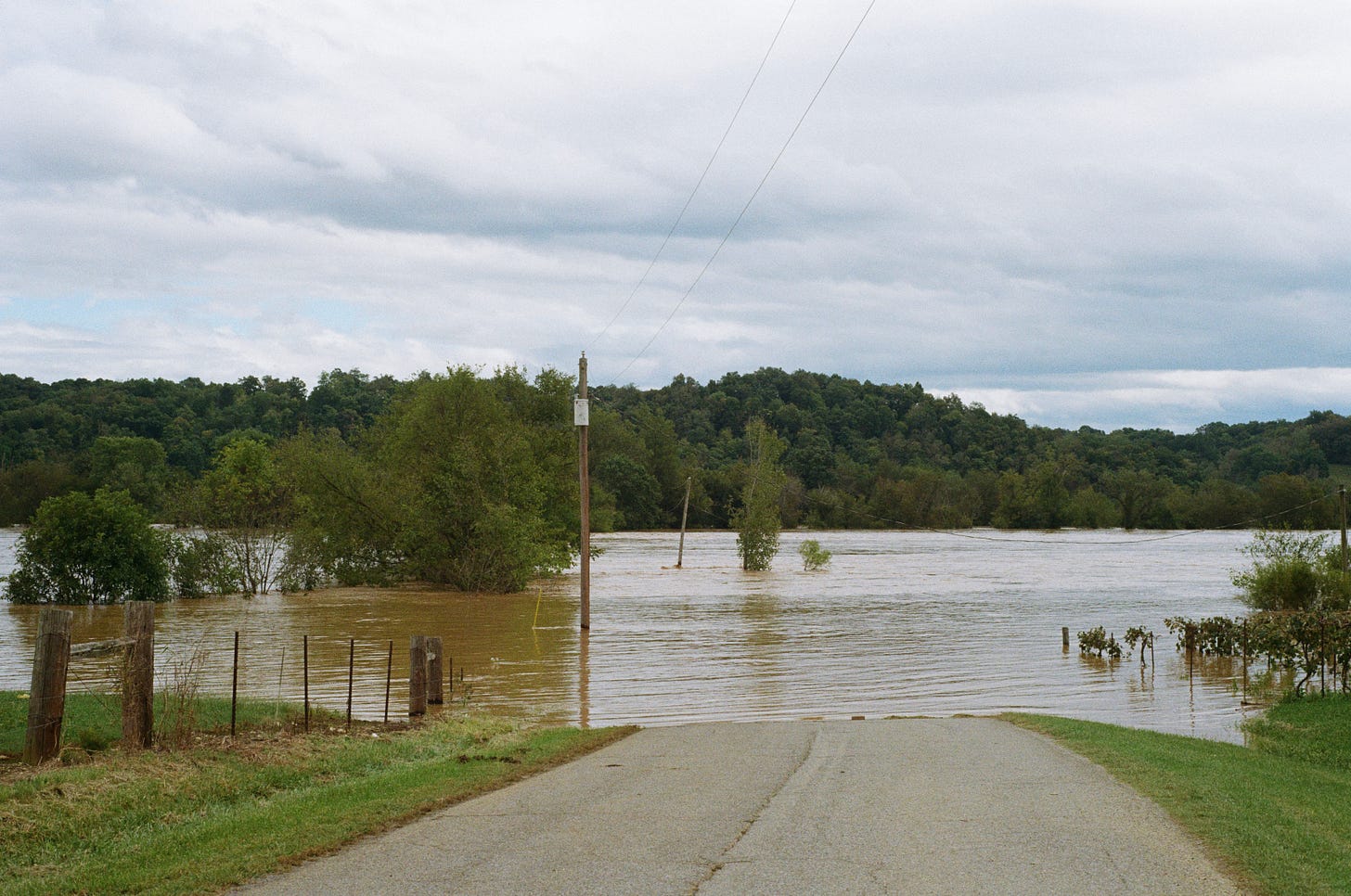
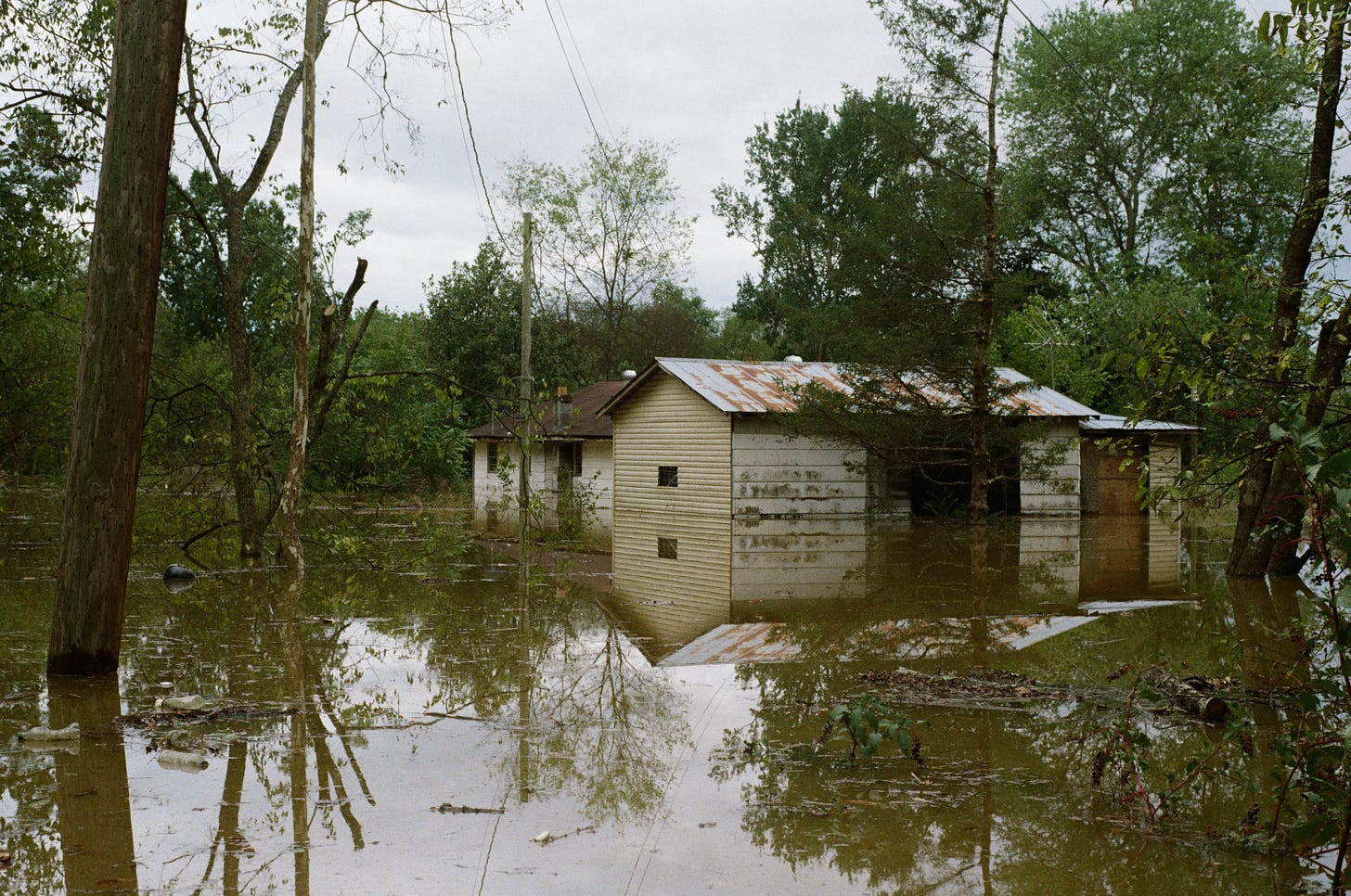
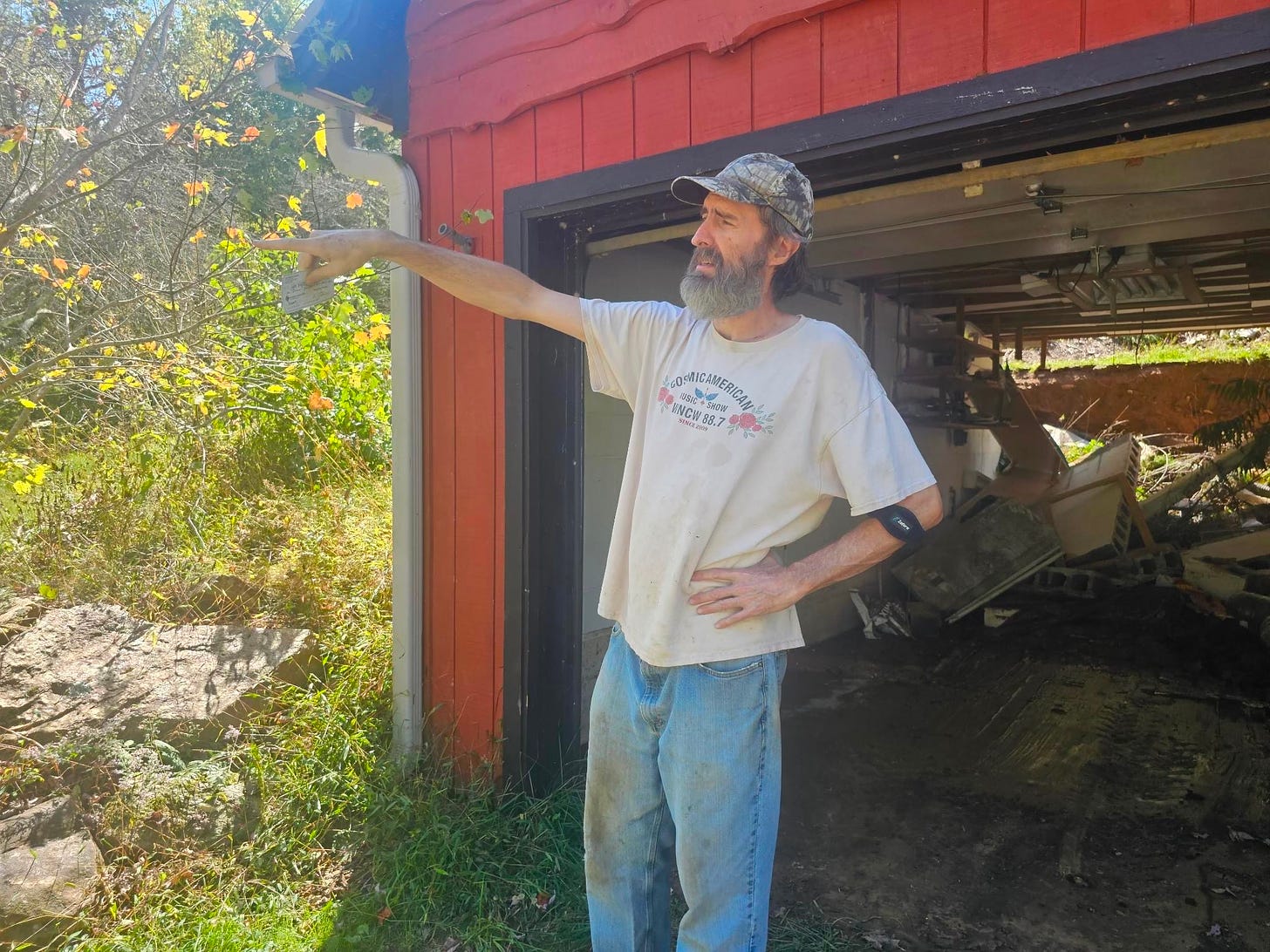
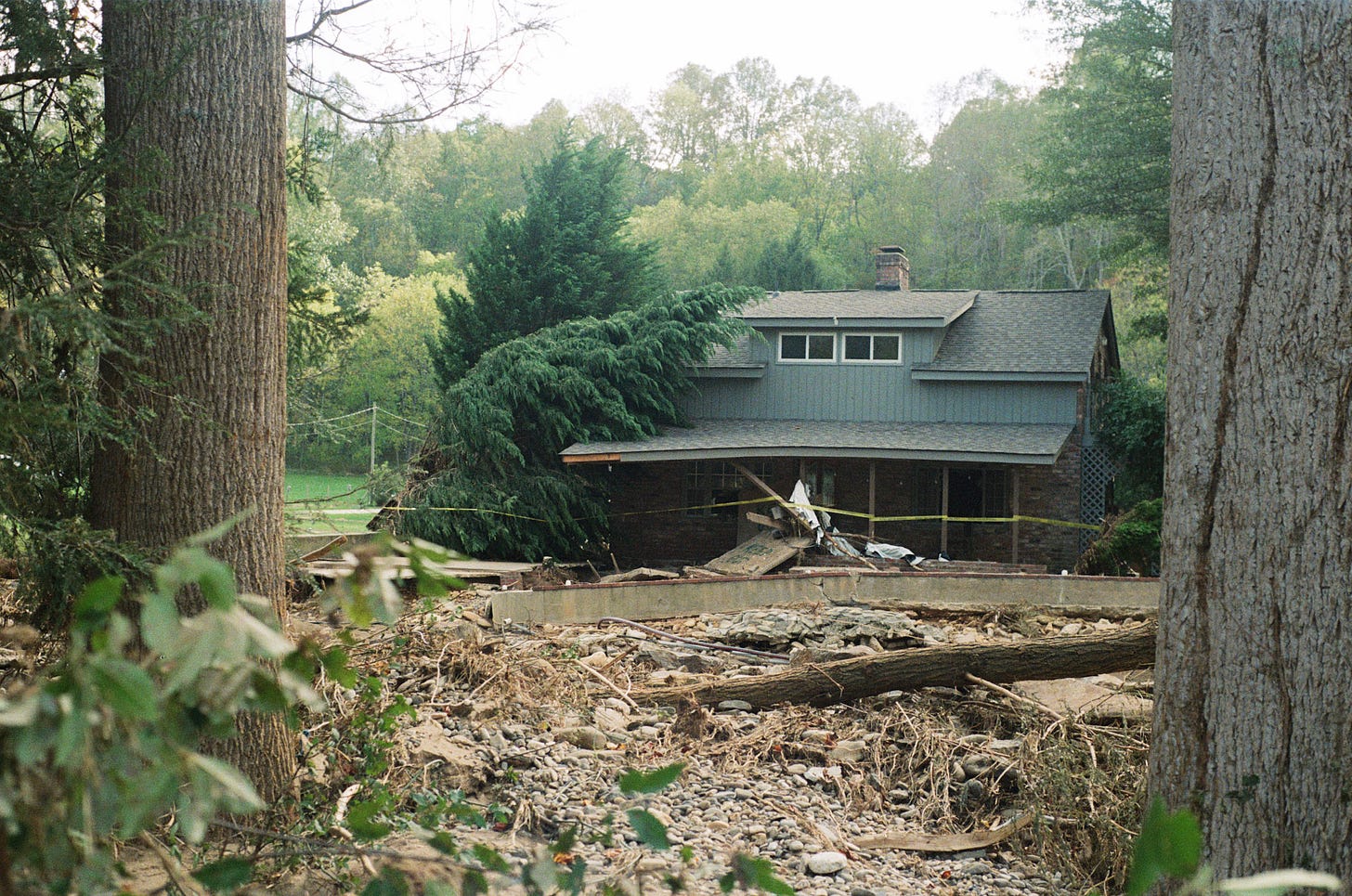
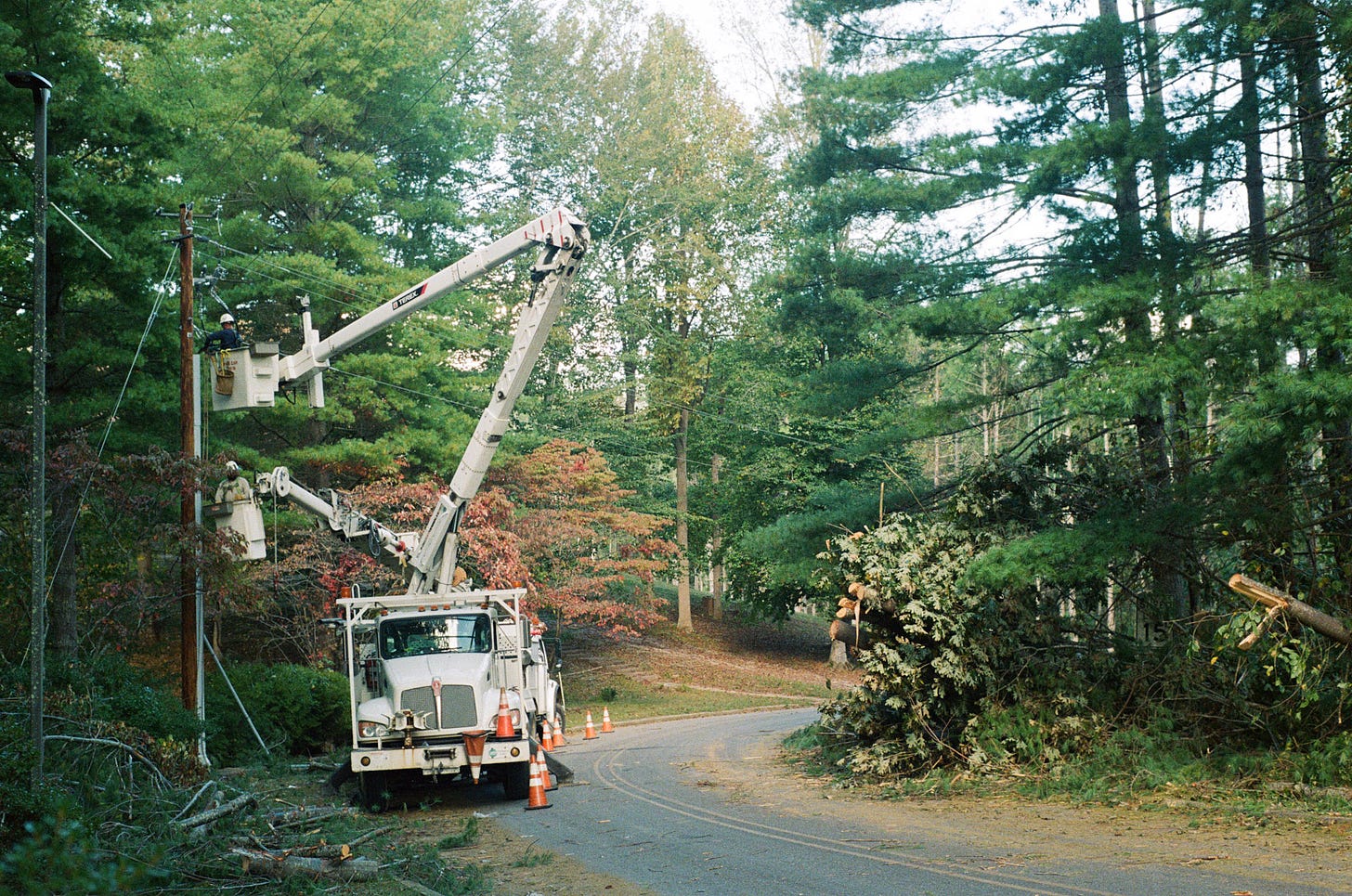
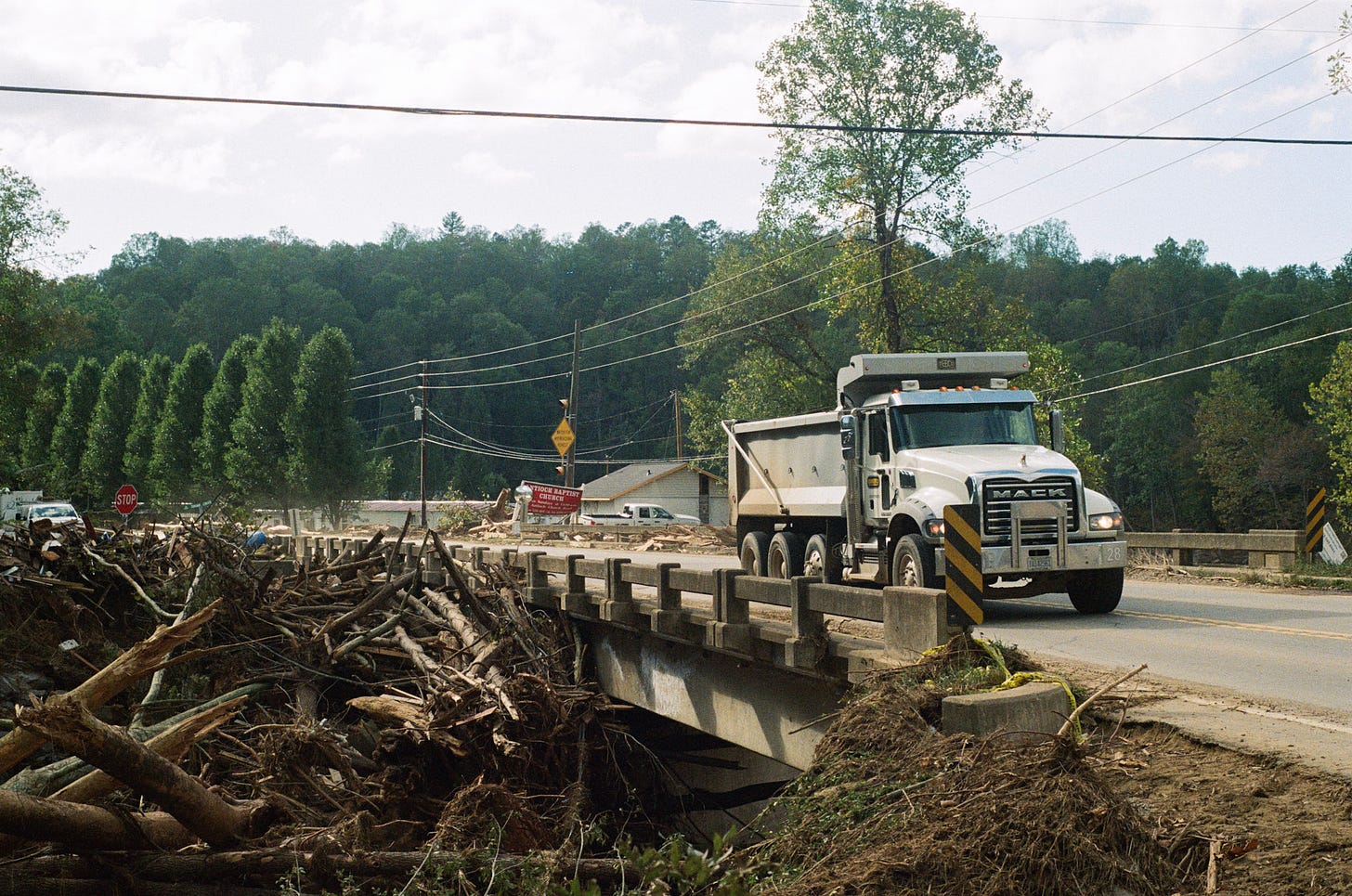
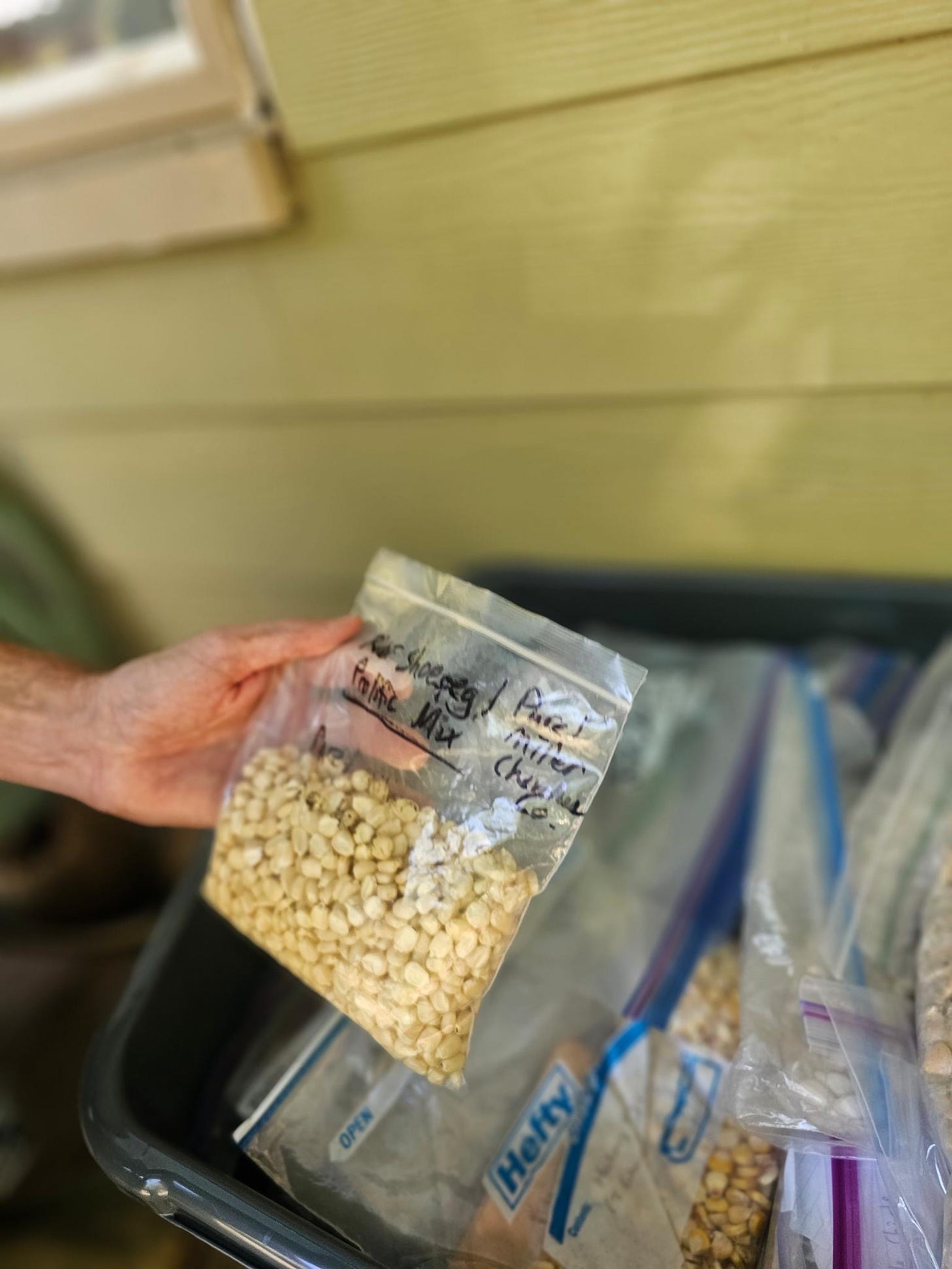
Is there a place to donate towards building the new seed shed?